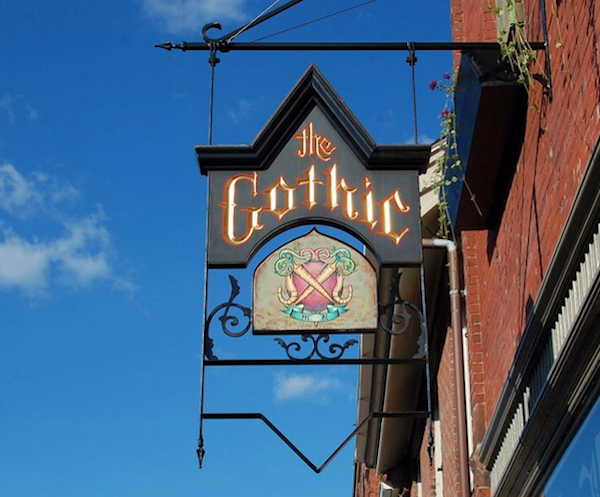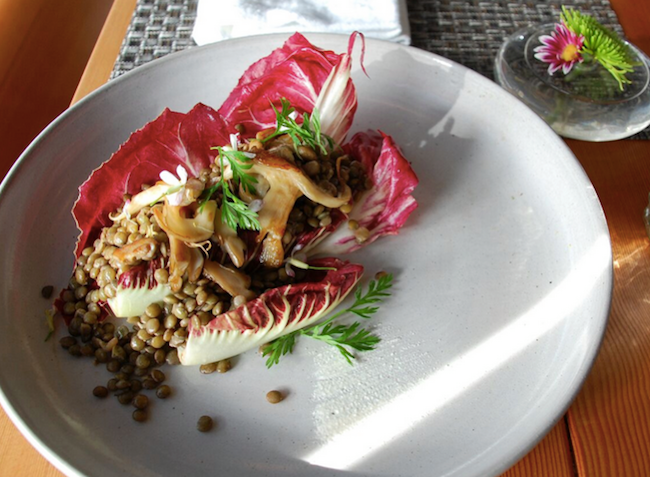Fuse Food Review: The Gothic — A Destination for Locavores Exploring the Mid-Maine coast
Matthew Kenney, chef/owner of The Gothic, bills himself as “the world’s leading plant-based chef” — he is on a crusade to remake the future of food.
The Gothic, a restaurant in Belfast, Maine

By Glenn Rifkin
When my wife and I arrived back on the Maine coast after a week on an idyllic but extremely rustic island, we decided to drive south and spend the night in Belfast, a picturesque little city on Penobscot Bay. After a week of preparing our own food on a propane stove in a 200-year old farmhouse without running water, bathrooms or showers, a nice restaurant meal was in order. And in Belfast, we found a most unexpected but tantalizing eatery called The Gothic, a farm-to-table vegetarian restaurant in an old bank building on Main Street.
The Gothic is owned by famed, award-winning chef/owner Matthew Kenney, a raw food guru and author who has built a collection of vegetarian/vegan places around the country. It turns out that Kenney grew up on the coast of Maine and decided to bring his talents back to his native soil in the form of The Gothic.
As someone highly unlikely to choose a vegetarian dining experience, I went into The Gothic with some trepidation. My wife Janie is an unapologetic foodie who loves nothing more than to try new places opened by famous chefs. Kenney, a graduate of the French Culinary Institute, who bills himself as “the world’s leading plant-based chef,” is on a crusade to remake the future of food. He was named one of America’s Best New Chefs by Food and Wine magazine, but soon after discovered and embraced a new way to prepare and serve delicious meals using seasonal, local, plant-based ingredients. He was so enamored of the concept that he created a raw food culinary academy to teach the methods around the world.
Set down in unassuming Belfast, The Gothic is a spare but pleasing space situated in the old Belfast National Bank building, which was constructed in 1878. The original 16-foot tin ceiling and period wall moldings and window frames give the restaurant its panache, but it is the food that makes The Gothic a destination location for locavores exploring the mid-Maine coast.
Where else will you get a chance to be served by a waitress such as Sarah Tompkins, the farmer from nearby Searsmont who provides some of the delicacies on the spare but satisfying menu. It is always nice to have a knowledgeable server, but when she actually owns the farm — Fine Line Farm — where ingredients are grown, she can help you make some well-informed choices.
On this night, we ordered a couple of outstanding St. Feuillien saisons, a Belgian farmhouse ale, while we looked over the menu. The Gothic, under new head chef Matt Downes, serves small plates, not unlike tapas, with the idea that a few of these delectable dishes will add up to a meal. How right they are.
Downes most recently was at the D.O.M., a two-Michelin star eatery in Sao Paolo, Brazil. In taking control at The Gothic, he is building on Kenney’s vision for vegetarian fare with flair. Sarah brought us an earthy Amuse Bouche of chilled asparagus soup served with juniper foam and black trumpet dust. Janie and I then shared several plates including the divine curried sweet potato fritters with mustard green chutney. Those were so good, we ordered a second serving.
We then tried the squash tendrils with lemon and pistachios and a Caesar salad with baby romaine, sunflower greens, and Bachelor Button flower petals. This was where vegetarian morphed into vegan and made a believer out of a meat-eater like me. I am nowhere near ready to join this movement, but I was more than pleasantly surprised that these dishes were both delicious and satisfying. We then shared the mushroom Agnolotti, a gluten-free dish of homemade pasta and locally grown mushrooms that was the perfect next course.

A plate of mushrooms and lentils at The Gothic.
The menu also includes fiddlehead ferns, pate with mushroom, pickled mustard seed and toast, almond gazpacho, charred carrots, seared radicchio and soba noodles. Had I not indulged in the cuisine, I would have smiled and politely declined such fare. But in Kenney’s vision of the future of food, delicious is a key element in the plan. Succeeding in a remote spot like Belfast will be a challenge for The Gothic, but this city, once a thriving port and later a center for shipbuilding, emerged from financial ruin in the 1990s when MBNA, the credit card giant, opened operations in the city. With the natural beauty of the area and the lure of inexpensive homes and rents, Belfast became a Mecca for artists and other creative types seeking a rustic lifestyle.
Kenney believes in the area so deeply that he opened the Plantlab, an experimental kitchen and laboratory for plant-based cuisine, across the street from The Gothic in Belfast. Given that his other restaurants and culinary education locations are in places like Los Angeles, Miami, and Thailand, it is clear that he sees something special in this waterfront city on the Maine coast.
We ended our meal with a thyme-flavored strawberry shortcake, served with Chantilly and a rhubarb sorbet. It might have been the finest strawberry shortcake I’ve ever had. Summer in Maine will always mean lobster rolls, clambakes, and wild blueberries. But if you are heading Down East anytime soon and want a reason to broaden your palate, The Gothic is a side trip worth taking.
Glenn Rifkin is a veteran journalist and author who has covered business for many publications including The New York Times for more than 25 years. Among his books are Radical Marketing and The Ultimate Entrepreneur. His efforts as an arts critic and food writer represent a new and exciting direction.
